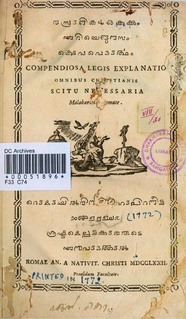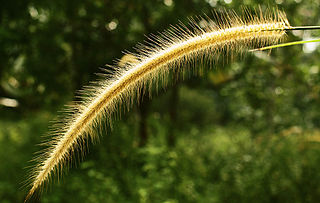
Malayalam, the lingua franca of the Indian state of Kerala and the union territories of Lakshadweep and Puduchery, is one of the six Classical languages of India. Malayalam literature comprises those literary texts written in Malayalam, a South-Dravidian language spoken in the Indian state of Kerala. The first travelogue in any Indian language is the Malayalam Varthamanappusthakam, written by Paremmakkal Thoma Kathanar in 1785. Malayalam literature has been presented with 6 Jnanapith awards, the second-most for any Dravidian language and the third-highest for any Indian language.

Narayana Guru, IPA: [n̪ɐːɾɐːjɐɳɐ guɾu], was a philosopher, spiritual leader and social reformer in India. He led a reform movement against the injustice in the caste-ridden society of Kerala in order to promote spiritual enlightenment and social equality.

Chattampi Swamikal was a Hindu sage and social reformer. His thoughts and work influenced the launching of many social, religious, literary and political organisations and movements in Kerala and for the first time gave voice to those who were marginalised.
Perumanoor Gopinathan Pillai, more popularly known as Guru Gopinath was a well known actor-cum-dancer. He is well regarded as the greatest preserver of the dance tradition. He is a recipient of the Sangeet Natak Akademi Award.

Vedanta Desikan (1268–1369), also rendered Vedanta Desikar, Swami Vedanta Desikan, and Thoopul Nigamaantha Desikan, was an Indian polymath who wrote philosophical as well as religious and poetical works in several languages, including Sanskrit, Manipravaḷam, Tamil and Prakrit. He was an Indian philosopher, Sri Vaishnava guru, and one of the most brilliant stalwarts of Sri Vaishnavism in the post-Ramanuja period. He was a Hindu devotee, poet, Master of Acharyas (desikan) and a logician and mathematician. He was the disciple of Kidambi Appullar, also known as Athreya Ramanujachariar, who himself was of a master-disciple lineage that began with Ramanuja. Vedanta Desikan is considered to be avatar (incarnation) of the divine bell of Venkateshvara of Tirumala by the Vadakalai sect of Sri Vaishnavism. Vedanta Desikan belongs to Vishwamitra/Kaushika gotra.

Paravoor Govindan Devarajan (1927-2006), popularly known as G. Devarajan or Devarajan master, was an Indian music composer and Carnatic singer. He is widely regarded as one of the greatest composers in the history of Indian film music. He scored music for more than three hundred Malayalam films, many dramas, and twenty Tamil and four Kannada movies. His collaborations with Vayalar Ramavarma produced the golden era of Malayalam film music and many of his compositions remain ever green classics in Malayalam. His music in the Tamil film Annai Velankanni has received many accolades. Devarajan received Kerala Government's Best Music Director award five times, among other honours. In 2005, he was honoured with the J. C. Daniel Award, Kerala government's highest honour for contributions to Malayalam cinema.

Alagiya Manavalan, best known by his epithet Manavala Mamunigallit. 'The great saint, Manavalan' (1370–1450), was a Hindu theologian. He was a major proponent of the Sri Vaishnavism tradition in the 15th century in Tamilakam, disseminating it with the help of his eight disciples. The disciples of Manavalan established places of learning to teach the Vishishtadvaita philosophy in Tamilakam.

Kanakku Chembakaraman Kesava Pillai (1868–1914) was an Indian composer of Carnatic music and a poet of Malayalam literature. He was the Poet Laureate of Travancore and was known for Kesaveeyam, a mahakavya in Malayalam, two attakathas and several bhajans and kirtans. He also translated the Sanskrit text, Narayaniyam, into Malayalam under the title, Bhashanarayaniyam.

Sooranad North is a village in Kollam district in the south west Indian state of Kerala. It is believed that Sooranad was ruled by King SOORAN and hence the name.
L. Gundappa M.A. (1903-1986) was professor of Kannada literature in Bangalore University and a pioneer in the Kannada literature revival, inspired by his mentor, B. M. Srikantaiah. He was an accomplished poet and writer who introduced Kannada readers to world literature by translating classics from ancient Kannada and Classic Tamil to modern Kannada. He translated short stories of Tolstoy from English, and won a gold medal for the translation of a poem by Matthew Arnold to Kannada. He worked on the first dictionary from English to Kannada. He wrote a definitive book on the art of translation called Kannadi Seyve (mirroring). He was honored by both the Kannada and Tamil people for his service to literature.

Nelliyode Vasudevan Namboodiri or Nelliyod Vasudevan Namboodiri was a Kathakali artiste, noted primarily for his vibrant portrayal of the evil chuvanna thaadi roles of the classical Kathakali dance-drama from Kerala in south India. He was also very famous and known for the characters 'Kuchelan' from Kuchelavritham and 'Aashaari' from Bakavadham.

Paduka is an ancient form of footwear in India, consisting of little more than a sole with a post and knob which is engaged between the big and second toe. It has been historically worn in South Asia and Southeast Asia. Paduka exist in a variety of forms and materials. They might be made in the shape of actual feet, or of fish, for example, and have been made of wood, ivory and silver. They may be elaborately decorated, such as when used as part of a bride's trousseau, but could also be given as religious offerings or themselves be the object of veneration.

Sooranad P. N. Kunjan Pillai was an Indian researcher, lexicographer, poet, essayist, literary critic, orator, grammarian, educationist, and scholar of the Malayalam language, best remembered for his contributions in compiling Malayala Maha Nighantu, a lexicon. The Government of India awarded him the fourth highest civilian honour of the Padmashri in 1984 for his contribution to Malayalam literature and education. He was also a recipient of the Vallathol Award in 1992 and when the Government of Kerala instituted the Ezhuthachan Puraskaram, their highest literary honour in 1993, he received the inaugural award.
Vennikkulam Gopala Kurup (1902–1980) was an Indian poet, playwright, translator, lexicographer and story writer of Malayalam. He was the author of a number of poetry anthologies, besides other works, and he translated Abhijnana Shakuntalam, Tulsi Ramayana, Tirukkuṛaḷ, the poems of Subramania Bharati and two cantos of The Light of Asia of Edwin Arnold into Malayalam. He also contributed in the preparation of a dictionary, Kairali Kosham. A recipient of the Odakkuzhal Award and Thirukural Award, Kurup received the Kerala Sahitya Akademi Award for Poetry in 1966. Sahitya Akademi honoured him with their annual award in 1974.
Bodheswaran, , was an Indian independence activist, social reformer and a poet of Malayalam literature. He was known for his nationalistic poems such as Keralaganam and for his involvement in social movements like Vaikom Satyagraha and other related events which led to the Temple Entry Proclamation of 1936.
Thycaud Ayyavu Swamikal was a spiritualist and a social reformer, the first to break customs related to caste in Kerala when caste restrictions and untouchability were at its extreme.

Kurissery Gopala Pillai was an orientalist, researcher, lexicographer, poet, essayist, grammarian and scholar of Malayalam and Sanskrit languages. He specialised in Comparative study of languages.
R. Narayana Panickar was an Indian essayist, playwright, translator, lexicographer, novelist and historian of Malayalam. He was credited with over 100 books but the best known among them are the six-volume work, Kerala Bhasha Sahithya Charthram, a comprehensive history of Malayalam literature up to 1954 and Navayuga Bhasha Nighantu, a lexicon. He also wrote a number of novels and translated several classics of Tamil literature including Purananuru, Akanaṉūṟu and Silappatikaram. Sahitya Akademi honoured him with their annual award in 1955.

Kalamandalam Ramachandran Unnithan is a Kathakali exponent from Kerala, India. He received several awards including the Sangeet Natak Akademi Award 2016. His biography titled Kachaiyum Mizhukkum was published in 2015.
Tonnakkal Peethambaran is a Kathakali exponent from Kerala, India. He has been honored with several noted awards including the Sangeet Natak Akademi Award 2011, Kerala state Kathakali award 2014 and Kerala Sangeetha Nataka Akademi award 2003.












